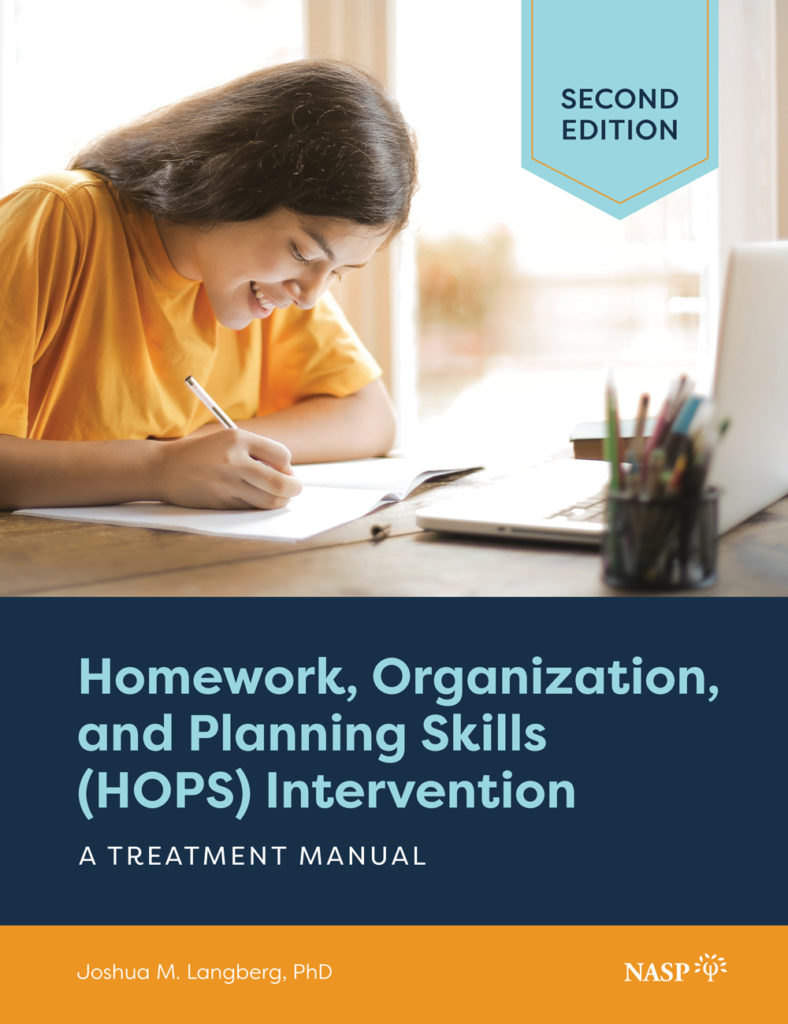About the HOPS Intervention
The Homework, Organization, and Time-Management Skills (HOPS) intervention was developed by Joshua M. Langberg, Ph.D., a clinical psychologist, with support from the U.S. Department of Education, Institute of Education Sciences (IES). The HOPS intervention teaches students organization and time-management skills and how to apply those skills to effectively complete homework and prepare for tests. HOPS intervention has been evaluated in multiple randomized trials and found to be effective for middle school students diagnosed with Attention-Deficit/Hyperactivity Disorder (ADHD).

The National Association of School Psychologists (NASP) published the 1st edition of HOPS intervention manual for schools in 2011 and the 2nd edition in 2022. There is also a HOPS guide for parents published in 2014. Since the HOPS manual for schools was released, many schools across the United States and abroad have implemented HOPS for students ranging from grades 3 through 12 and for students with and without ADHD. HOPS has primarily been evaluated using a 1 to 1 service delivery model (e.g., one clinician working with one student). However, many schools implement HOPS using small group and class-wide models. HOPS can be implemented in both school and clinic settings. The 2nd edition of manual can be purchased in either print or digital versions, includes detailed information about online/computer organization and time management skills, and provides updated checklists. Importantly, the 2nd edition comes with a code where you can download the checklists in editable format from NASP.
The purpose of this website is to provide individuals interested in implementing HOPS with the resources necessary to get started. The website provides brief videos that explain HOPS and provide implementation tips. You will also find answers to frequently asked questions and information about how to receive in-person training. Both the treatment manual and the parent guide can be purchased on the NASP website.
What types of students can benefit from the HOPS intervention?
- HOPS was developed for middle school students with Attention-Deficit/Hyperactivity Disorder (ADHD) because they often experience difficulties with organization and time-management. However, many students have difficulties with organization and time-management and most students can benefit from learning how to manage their materials and time efficiently. HOPS can be implemented with elementary students, once they are expected to self-manage their materials; typically around 3rd or 4th grade. HOPS can also be implemented with middle and high school students. Oftentimes, schools consider the HOPS intervention when students are having difficulties with homework management and completion and/or are procrastinating and not preparing adequately for tests.
What will HOPS improve?
- As the name implies, HOPS targets organization, time-management, and planning skills, primarily surrounding homework completion and studying for tests. Studies of the HOPS show that students make improvements on all of the outcomes directly targeted by the intervention. It is important to remember that students can struggle academically and have missing assignments and low or failing grades for many reasons other than organization and time-management skills (e.g., below grade level reading or math or anxiety). Accordingly, a student might significantly improve organization and planning skills with the HOPS intervention but continue to have academic difficulties. We would not expect students to improve in aspects of functioning not specifically targeted with intervention. If after implementing HOPS organization and time-management skills improve but academic impairment remains, further assessment may be warranted.
Who can implement HOPS?
- School counselors and school psychologists have implemented HOPS in the majority of studies where HOPS has been evaluated. However, teachers and mental health clinicians could also implement HOPS and parents can use the parent manual to apply some of the strategies on their own.